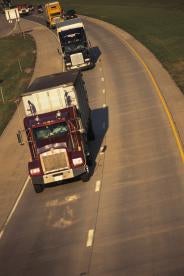As of December 16, 2015, the Federal Motor Carrier Safety Administration (FMCSA) announced and published the final rule requiring the use of electronic logging devices (ELD) by all drivers required to complete paper records or logs of duty status. Drivers falling into this category are required to adopt or use compliant ELDs by December 2017, unless they are presently using "ELD-like" devices. Use of ELD-like devices will continue to be permitted provided they meet the current standards for Automatic On-Board Recording Devices (AOBRD) as set forth in 49 CFR 395.15, but only until December 2019. Use after this date of such devices will be allowed only if the device can be modified to meet ELD specifications. The maintaining of these deadlines remaining in effect is contingent upon further litigation, including a Petition for Review filed by the Owner-Operator Independent Drivers Association (OOIDA).
There are limited exceptions to the rule for short haul drivers based on time, distance and vehicle age. Should a short haul driver occasionally not meet the exempt conditions, a paper log would still be required. An ELD must be capable of performing the following: accurately record a driver's hours of service and the vehicle's location; be tamper resistant; be synchronized to the vehicle's engine or be able to recognize when the vehicle was in operation; allow and permit law enforcement access to it during roadside inspections.
The main purpose of the rule requiring use of ELDs is to decrease hours of service violations, decrease fatigued driving, and reduce accidents. A cost-benefit analysis conducted by FMCSA estimated an annual savings in excess of $1 billion dollars. The estimated costs of implementing and converting to ELDs was slightly less than $2 billion annually compared to an estimated annual savings of $3 billion. The safety benefits associated with the use of ELDs are evident as the FMCSA estimates that the rule will prevent 20 fatalities and 434 injuries per year.
To determine how the use of ELDs is actually impacting drivers, feedback was obtained from a small sampling of drivers in the Central Illinois area already using ELDs. As expected with any change, drivers did not care for the ELDs at first, but after training and becoming accustomed to its use, they like the ease of use and the elimination of paperwork previously required. One driver mentioned the convenience of having the ability to push a button and sending his information via Bluetooth to the employer carrier. The ELD eliminates the ability to "fudge" or "cheat" as any attempt to disable or unplug the ELD would result in shutting the truck down or not allowing it to start.
One driver for a local carrier stated the ELD is set for 14 hours per day with 11 hours of drive time and a required half hour break to be taken within the first 8 hours. In the event the break is not taken or missed, the ELD shows a red-line through the display providing notice that the break was not taken. If a driver is nearing the expiration of the 14 hours, they receive a warning 60 minutes ahead of time. This allows the driver time to find a rest area or truck stop to park for the next eight hours. The recent overcrowding of rest stops with trucks lined up on the entrances and exits in addition to filling the parking areas are indicative of ELD use. As drivers and carriers become more compliant with the rule, this could become a potential issue.
One independent owner-operator interviewed continues to utilize paper logs as he has done so for the entirety of his career. Although he enjoys working and driving, he is resistant to complying with the requirement due to the expense involved, which is a concern of most small carriers and operators. If the deadlines remain in effect, he has indicated he would sell his vehicle and retire, a decision which likely to be common in this category of drivers and operators. He is one of many who will be watching and waiting for the outcome of the petition filed by OOIDA and challenges to the deadlines and requirements of the rule.




 i
i

